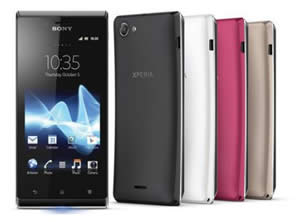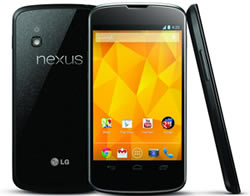Difference between Sony Xperia J and Nexus 4
Key difference: Xperia J was announced in October 2012 as a cheaper variant of the Xperia T, resulting in the phone sporting a similar design to the T. The Xperia J features a 4-inch scratch-resistant TFT touchscreen that offers a pixel density of 245. The Nexus 4 is Google's fourth Nexus-branded Android smartphone. It was produced in collaboration with LG Electronics. The phone runs on the Android 4.2 (Jelly Bean) operating system, which was launched with the phone.

Xperia is a well known brand of smartphones that are a part of the Sony Mobile. The Xperia brand was initially a collaboration with Ericsson but has since then been dissolved. Now, Sony has single handedly taken it upon itself to ship out new phones, while maintaining the level of quality and design of the older versions. In order to garner response for its new line of smartphones, the company started marketing the Sony Xperia T as the Bond phone, which is featured in the movie Skyfall. Xperia J is the shy, younger brother of the Bond phone, and is also cheap to boot.
The Xperia J was announced in October 2012 as a cheaper variant of the Xperia T, resulting in the phone sporting a similar design to the T. The Xperia J features a 4-inch scratch-resistant TFT touchscreen that offers a pixel density of 245. The pixel density is the not the best among the contenders, but that does not hinder the high-res display that is visible on the phone. The display shows quite smart and sharp images, with very accurate color representation. The display also has excellent viewing angles and does is less reflective under sunlight.
The design of the phone is also quite similar to Xperia T. The phone comes with a plastic chassis that has a sturdy built. The Xperia J has an arched back similar to Xperia Arc series, which is pleasing to hold and grip. The silver plastic lining that graces the other Xperia series has been shifted to the bottom and acts as a second LED indicator during calls. The phone is also quite light, weighing only 124 grams. The Timescape UI is very similar to the original Google Android UI and basically seems like cheap imitations. The phone has three capacitive buttons on the bottom of the screen, Back, Home and Menu buttons. The buttons are placed on the far bottom of the device, making it more prone for the user to drop the device. The top of the device houses the 3.5mm jack, while the left side has the USB/charging port. The right side of the device is quite busy with the power/lock key on the top right hand and the volume rocker just below the power key.
The device is powered by 1 GHz Qualcomm processor and only 512 MB, which makes the device a little glitch and lagging when trying to shift screens as well as switch apps. The device, when not multitasking and doing basic functions, still lags a little. The device comes with 4 GB of internal space, of which only 2 GB is available to the user. This is very little compared to phones that are offering 8/16/32 and even 64 GB. However, the company has provided a SD card slot that allows users to expand memory by another 32 GB.
The device houses a 5 MP rear camera with autofocus feature. Just above it, a LED flash light can also be found. However, the front camera and the video recording capabilities are a little disappointing. Both, the front camera and video recording are VGA, which does provide the best resolution. The 5 MP camera is pretty decent, but if you have gotten used to the high-res 8 and 12 MP cameras, this camera will not at all be pleasing. The camera takes decent photos, but it isn’t sharp, clear or even HD for that matter. However, the phone does come with juice, 1750 mAh to be exact. This ensures that the phone last a couple of days when not in constant use and at least a full day when working with it all day. The company does offer features such as Wi-Fi hotspot, Bluetooth and USB, but it does not offer NFC capabilities.

A number of these companies’ smartphones and tablets run on Android. Android is an open source software, which means that the code is freely available for modification and distribution by device manufacturers, wireless carriers and enthusiast developers. Among the number of various companies, Google has also launched its own line of smartphones based on Android, called the Google Nexus. Each device in the Nexus line is produced via collaboration between Google and a leading original equipment manufacturer (OEM) partner.
The Nexus devices in general have an advantage over other devices in that the Android in the Nexus devices is pure, i.e. the Android does not have any manufacturer or wireless carrier modifications to it, such as a custom graphical user interface. The Android also has an unlockable bootloader to allow further development and end-user modification, all of which is usually blocked on other Android smartphones.
The Nexus 4 is Google's fourth Nexus-branded Android smartphone. It was produced in collaboration with LG Electronics. The phone features a 1.5 GHz quad-core Snapdragon S4 Pro processor, 2 GB of RAM, 8 or 16 GB of internal storage, front facing 1.3 megapixel camera and an 8 megapixel rear camera and a micro-SIM card tray. The phone runs on the Android 4.2 (Jelly Bean) operating system, which was launched with the phone. The phone also features a new camera technology, called the Photo Sphere. This allows one to take 360 deg Panorama shots.
The information for the detailed table about the two phones has been taken from Sony Mobile website, expertreviews.co.uk, Google website, knowyourmobile.com and GSMArena.com
|
|
Sony Xperia J |
Nexus 4 |
|
Launch Date |
October 2012 |
November 2012 |
|
Company |
Sony |
Google; designed in collaboration with and manufactured by LG Electronics. |
|
Size |
124.3 x 61.2 x 9.2 mm |
133.9 x 68.7 x 9.1 mm (5.27 x 2.70 x 0.36 in) |
|
Display |
4-inch scratch-resistant TFT touchscreen |
4.7 inches True HD IPS Plus capacitive touchscreen, |
|
Screen |
480 x 854 pixels (~245 ppi pixel density), 16 million colors |
768 x 1280 pixels, (~318 ppi pixel density) 16M colors |
|
Protection |
Corning Gorilla Glass |
Corning Gorilla Glass 2 |
|
Weight |
124 grams |
139g (4.90 oz) |
|
2G Network |
GSM 850 / 900 / 1800 / 1900 |
GSM 850 / 900 / 1800 / 1900 |
|
3G Network |
HSDPA 900 / 2100 - ST26i HSDPA 850 / 1900 / 2100 - ST26a |
HSDPA 850 / 900 / 1700 / 1900 / 2100 |
|
4G Network |
N/A |
No |
|
GUI |
Timescape UI |
Pure Android |
|
CPU speed |
1 GHz Qualcomm processor |
Quad-core 1.5 GHz Krait |
|
GPU |
Adreno 200 |
Adreno 320 |
|
OS |
Google Android 4.0 (Ice Cream Sandwich) |
Android OS, v4.2 (Jelly Bean), upgradable to v4.2.2 (Jelly Bean) |
|
Chipset |
Qualcomm MSM7227A Snapdragon |
Qualcomm APQ8064 Snapdragon |
|
RAM |
512 MB |
2 GB RAM |
|
SIM Size |
miniSIM |
microSIM |
|
Internal Memory |
4 GB (2 GB available to user) |
8/16 GB storage |
|
Expandable Memory |
Up to 32 GB |
No |
|
Sensors |
Accelerometer, Proximity sensor, Magnetometer |
Accelerometer, gyro, proximity, compass, barometer |
|
Connectivity |
GSM GPRS Up to 86 kbps (download). Up to 86 kbps (upload); GSM EDGE Up to 237 kbps (download). Up to 237 kbps (upload); microUSB v2.0; DLNA; Wi-Fi hotspot; Wi-Fi; Bluetooth |
WiFi 802.11 a/b/g/n, Bluetooth, NFC (Android Beam), Unlocked GSM/UMTS/HSPA+, GSM/EDGE/GPRS, 3G, HSPA+ 42, Wireless charging, SlimPort (TM) |
|
Data |
GPRS, EDGE, WLAN, Wi-Fi hotspot, Bluetooth and USB. |
WiFi, NFC, GPRS, EDGE, USB |
|
Speed |
HSDPA, 7.2 Mbps; HSUPA, 5.76 Mbps |
DC-HSDPA, 42 Mbps; HSDPA, 21 Mbps; HSUPA, 5.76 Mbps |
|
WLAN |
Wi-Fi 802.11 b/g/n, DLNA, Wi-Fi hotspot |
Wi-Fi 802.11 a/b/g/n, dual-band, DLNA, Wi-Fi hotspot |
|
Bluetooth |
Bluetooth v2.1 with A2DP, EDR |
Bluetooth v4.0 with A2DP |
|
USB |
microUSB v2.0 |
microUSB (SlimPort) v2.0 |
|
Primary Camera |
5 MP 2592х1944 pixels rear camera |
8 MP, 3264 x 2448 pixels, autofocus, LED flash, check quality |
|
Secondary Camera |
VGA (0.3 MP) front camera |
1.3 MP |
|
Video |
VGA |
1080p@30fps |
|
Camera Features |
|
|
|
Sound Enhancement |
xLOUD Experience Clear Stereo |
SNS integration Active noise cancellation with dedicated mic |
|
Audio supported formats |
MP3/ eAAC+/ WMA/ WAV player |
MP3/WAV/eAAC+/AC3 player |
|
Video supported formats |
MP4/ H.263/ H.264/ WMV player |
MP4/H.264/H.263 player |
|
Battery Capacity |
Removable Li-Ion 1750 mAh battery |
2100 mAh battery |
|
Talk time |
2G: 5 hours 36 min 3G: 607 hours |
No official data released |
|
Stand-by |
2G: 7 hours 18 min 3G: 618 hours |
No official data released |
|
Available Colors |
Black, White, Pink, Gold |
Black |
|
Messaging |
SMS (threaded view), MMS, Email, IM, Push Email |
SMS(threaded view), MMS, Email, Push Mail, IM, RSS |
|
Browser |
HTML5, Adobe Flash |
HTML5 |
|
Radio |
Stereo FM radio with RDS |
No |
|
GPS |
GPS with A-GPS support |
A-GPS support and GLONASS |
|
Java |
Java via Java MIDP emulator |
Java MIDP emulator |
|
Additional Features |
|
|
Image Courtesy: sonymobile.com, battellemedia.com









Add new comment